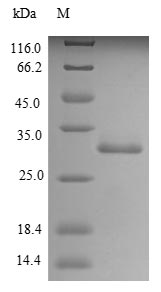Recombinant Rat Trypsin-4 (Try4) is produced in E. coli and contains the full length of the mature protein, covering amino acids 24 to 247. With an N-terminal 6xHis-tag, this protein is purified to over 85% as determined by SDS-PAGE analysis. It's designed strictly for research use, offering what appears to be a dependable tool for various biochemical applications.
Trypsin-4 is a serine protease that plays a role in protein digestion. Part of the trypsin family, it seems to be critical for catalyzing the hydrolysis of peptide bonds, which breaks down proteins. Scientists frequently study this enzyme for its role in protein processing, and it's become essential in research examining proteolytic pathways and digestive enzyme function.
Potential Applications
Note: The applications listed below are based on what we know about this protein's biological functions, published research, and experience from experts in the field. However, we haven't fully tested all of these applications ourselves yet. We'd recommend running some preliminary tests first to make sure they work for your specific research goals.
Rat Try4 is a serine protease that requires precise folding, proper activation (cleavage of the zymogen form), correct disulfide bond formation, and specific active site conformation for its enzymatic activity. The E. coli expression system cannot provide the eukaryotic folding environment or the proteolytic activation mechanism required for functional trypsin activity. While the protein contains the mature sequence (24-247aa), it will be produced as an inactive zymogen and cannot undergo the necessary proteolytic activation in E. coli. The N-terminal 6xHis-tag may sterically interfere with the protein's active site or substrate-binding domains. The probability of correct folding with functional protease activity is extremely low.
1. Antibody Development and Validation
This application is highly suitable as antibody development relies on antigenic sequence recognition rather than functional enzymatic activity. The full-length mature protein provides comprehensive epitope coverage for generating Try4-specific antibodies. The high purity (>85%) ensures minimal contamination-related issues during immunization.
2. Structural and Biophysical Characterization Studies
Basic structural analysis can be performed but will not reflect active trypsin structure. The protein will be in zymogen form with blocked active site, and the His-tag may interfere with crystallization. Techniques may characterize the proenzyme structure but cannot provide insights into the active protease conformation.
Final Recommendation & Action Plan
This E. coli-expressed Try4 will be produced as an inactive zymogen and cannot undergo the proteolytic activation required for functional protease activity. The protein is suitable for antibody development and biophysical characterization but has severe limitations for functional studies. For reliable trypsin research requiring enzymatic activity, use mammalian-expressed trypsin that undergoes proper zymogen activation, or activate this recombinant protein in vitro with appropriate proteases followed by rigorous activity validation.






